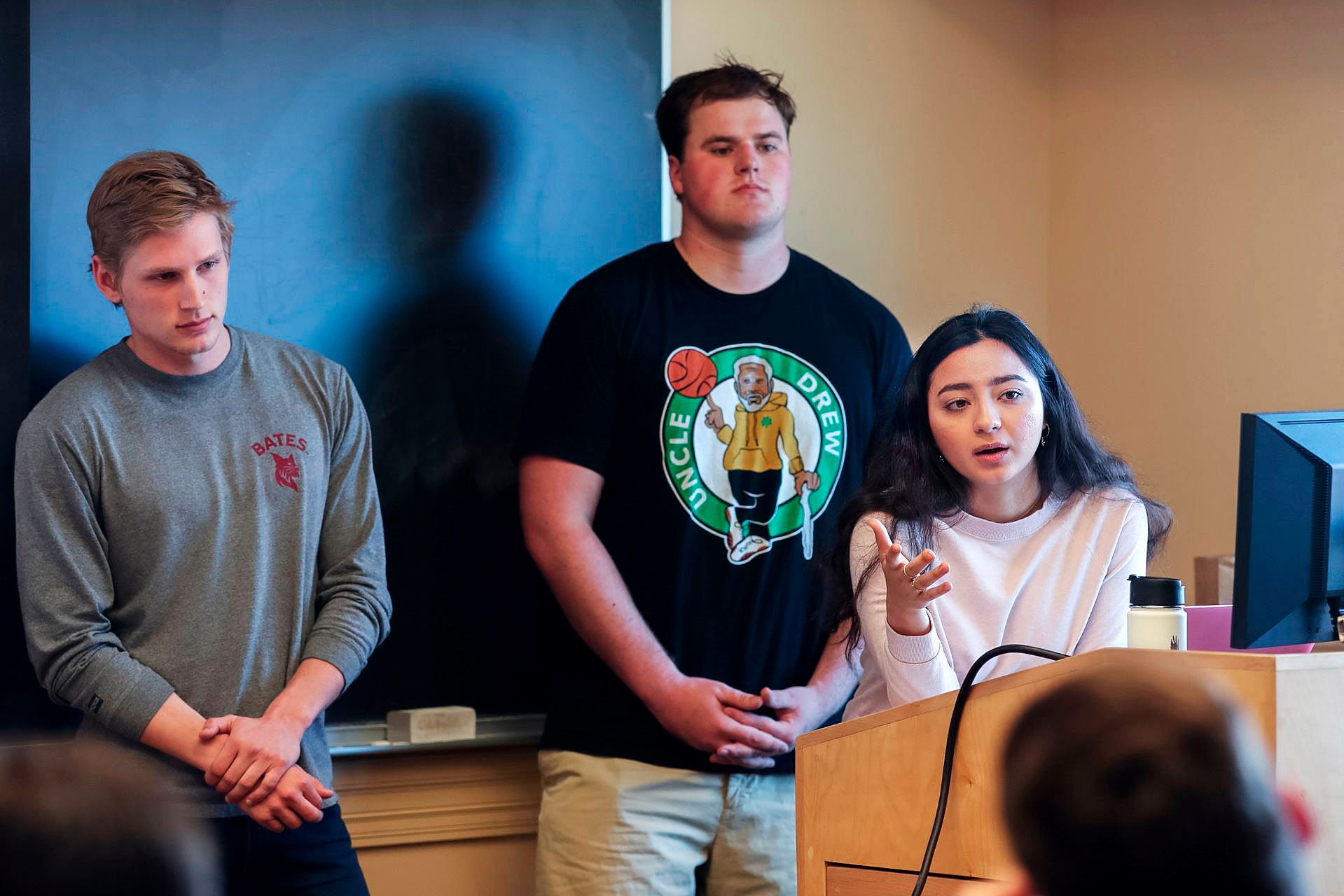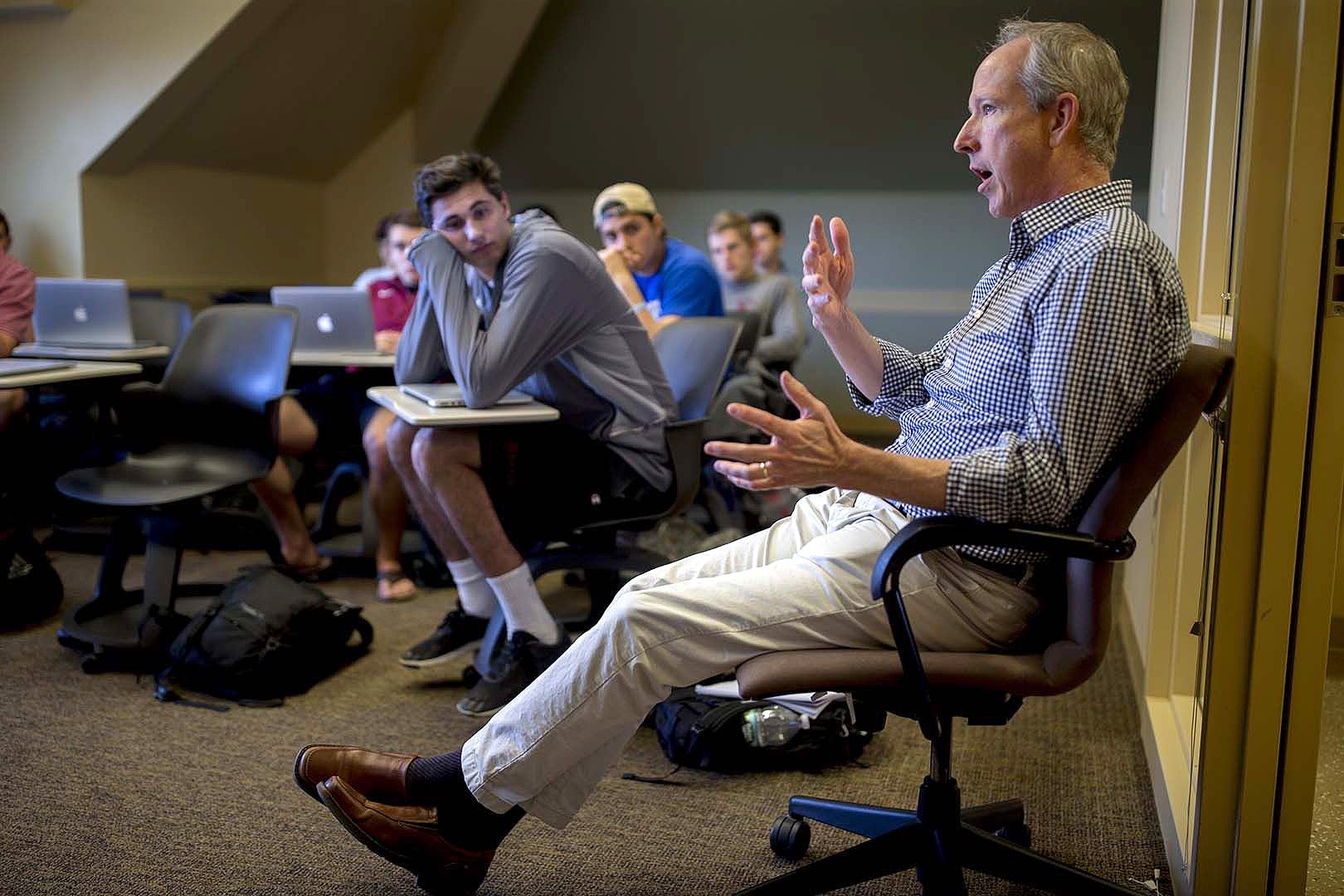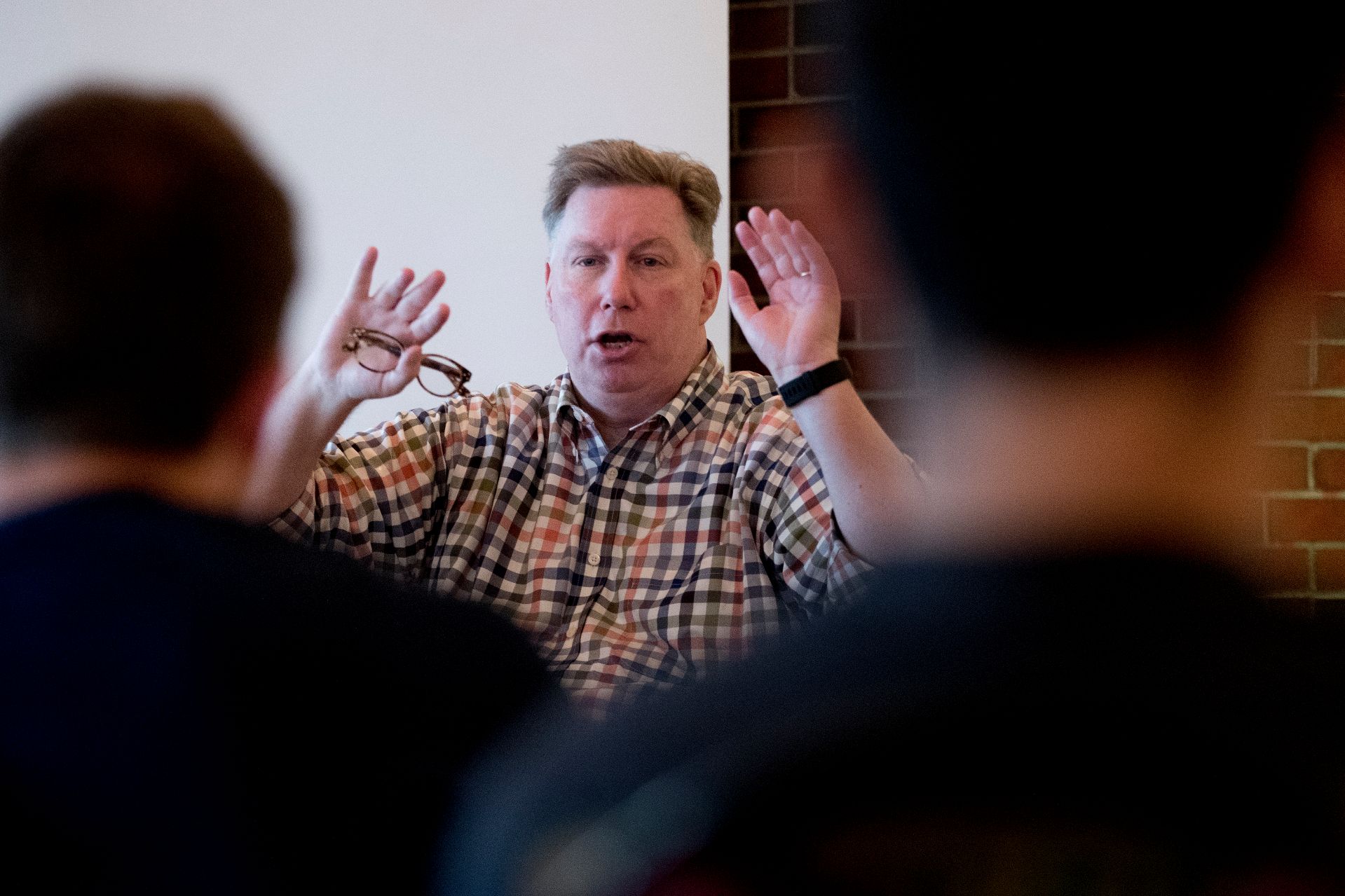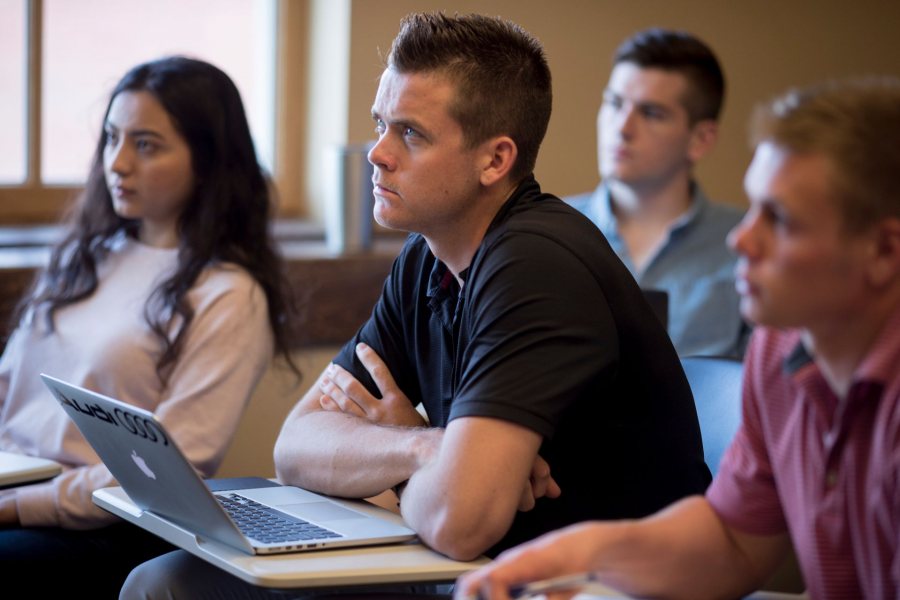
For Bates students taking a Short Term course on the ins and outs of private equity, Week Three opened with a check-in. Five small groups had been assigned to analyze companies that, hypothetically, were looking for investors. Today, the students were presenting their initial findings.
The companies themselves varied widely. One made packaging machines and software. Another supplied about a quarter of U.S. shopping malls with seasonal Santas and Easter bunnies.
The course instructor, John Chapman ’82, had once evaluated the same companies for his own private equity firm, Arcade Partners. Now he was back at his alma mater to teach “Practicum in Private Equity: Corporate Financial Decision Making, From IPOs to LBOs,” one of five Practitioner-Taught Courses offered this Short Term.

Phillip Simplicio ’20, Monica Luna ’21, and Ryan Corley ’19 present their first analysis of a company that makes machines and software for packaging products. By the end of their Short Term course in private equity, they’ll be able to tell a hypothetical investor if the company is a good bet. (Phyllis Graber Jensen/Bates College)
In one way, Chapman is simply paying it forward. “The best thing I can do is show them by example what I do every day,” says Chapman, who has more than three decades of experience in private equity.
In another way, Chapman is supporting a signature Bates program. He’s among the latest in a growing line of alumni who’ve made the college’s signature Purposeful Work program a runaway success by offering students insights, skills, and exposure that most liberal arts students can’t get until after graduation.
In fact, thanks to that sensible integration with Purposeful Work, Bates may be the only college of its kind to teach an undergraduate course in private equity,
On that Monday morning of Week Three, the students in Chapman’s course — some of them older economics majors with multiple finance internships under their belts, others younger students exploring their interests — gave presentations that followed the same processes Chapman uses in his work.

John Chapman ’82 asks questions during his students’ presentations of businesses under consideration for investment. Chapman, a principal at Arcade Partners in Hartford, has more than three decades of experience in private equity, which he’s brought to the classroom for the first time. (Phyllis Graber Jensen/Bates College)
They examined the financials. They prepared a SWOT analysis, a process that looks at strengths, weaknesses, opportunities, and threats facing a business. They suggested due diligence steps, such as assessing the strength of the company’s management and discerning long-term trends in its industry.
By the end of Short Term, they’ll be able to evaluate each company and recommend whether or not a private equity firm should invest in it.
Brand-new to the classroom, Chapman has gamely stepped up to the lectern. He has sought to provide a balance, he says, between “general discussions about aspects of private equity — why certain transactions are structured a certain way and what are some of the pitfalls — and some real financial scholarship.”
That means teaching some hard skills, such as how to read financial statements and how to calculate enterprise values and discounted cash flows. Those lessons proved useful for Eli Cooper ’19 of Glastonbury, Conn., an economics major who wants to work in private equity and who previously took a Short Term course in accounting.
Cooper has studied finance on his own in preparation for internship applications and has gotten advice from several Bates alumni. The private equity course, he says, has reaffirmed his interest in the field and taught him skills he’ll need to work in it.
“Getting to work with these models and look at revenue projections and profitability projections is something that’s been totally new,” Cooper says. “Sitting there and changing a lot of the numbers in the model and seeing how the bottom line is affected has been interesting.”
There’s also plenty of room in the course to learn what the day-to-day of private equity is like. The class has taken field trips to local businesses like Lewiston’s Baxter Brewing Co., an entrepreneurial venture that owes its existence and expansion to outside investors.
They’ve heard presentations from Bates alumni who work in private equity or other areas of finance. Rob Cramer ’79, managing director at Oppenheimer & Co., spoke about the role investment banks play in private equity transactions. Elise Chowdhry ’88, managing principal at Optimum Advisors, discussed due diligence, the steps potential investors can take to understand a business before committing to it.

Robert E. Cramer ’79, managing director at Oppenheimer & Co. speaks to students in the course “Private Equity: Corporate Financial Decisionmaking,” taught by John Chapman ’82. (Phyllis Graber Jensen/Bates College)
For Calvin Johnstone ’19 of Hopkinton, N.H., seeing the success of Bates alumni in finance — and learning the varied ways they got to where they are — revealed purposeful work in action.
“It’s nice to see how the hard work that you’re doing at Bates translates into the workplace,” he says. “What’s been reassuring for me, as someone who wants to work in this field, is that a lot of people who have visited have a wide range of different majors and backgrounds.”
Johnstone himself is evidence that almost any liberal arts major can be a guide to a business career: An environmental studies major, he’s interested in how energy enterprises are funded, and he has interned at utilities and in investment banking. He says the course’s blend of foundational skills and real-world exposure has broadened his sense of his own career path.

Whether they’re seniors with multiple finance internships under their belts or first-years exploring an interest in business, “Practicum in Private Equity” offers students exposure to the world of private equity as well as practical skills. (Phyllis Graber Jensen/Bates College)
It has become “more complicated, just because of the amount of amazing opportunities that are out there,” he says. “I find myself thinking, how can I explore all of these, whether it be private equity or venture capital or investment banking?”
In the meantime, both Johnstone and Cooper are part of a study group analyzing a company that specializes in displays for trade shows. Ahead of their final presentation, they’re studying the company’s past results and projecting its future growth. They’re deciding how much the company is worth and — if it’s a good idea to invest in it — exactly how to structure an offer.
The experience has “definitely been a big confidence boost,” Johnstone says. “Sometimes, as a liberal arts student, job interviews can be more difficult because you’re not as well-versed in the financial statements or the types of questions that you get at a more business-focused school.
“John’s assuaged some of those fears and showed us that, yes, there’s the technical side, which can be taught and which he showed us through Short Term — but there’s also this critical-thinking side that is much more difficult to teach, and it’s nurtured and developed at Bates.”




